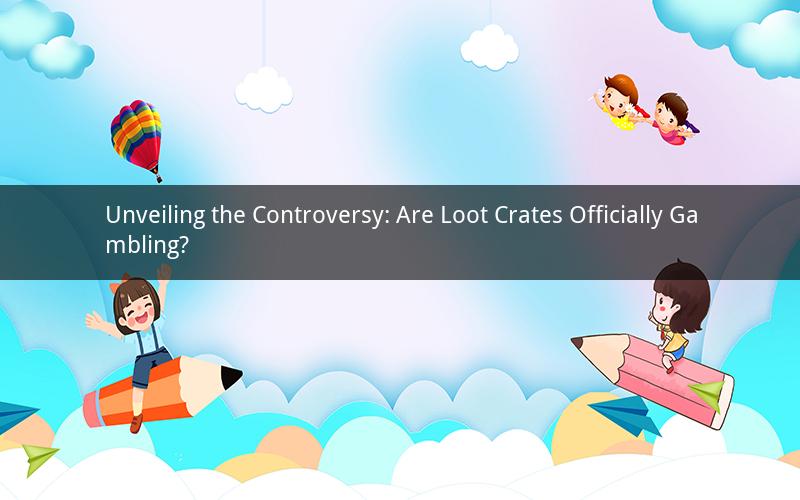
Loot crates have become a staple feature in modern video games, offering players the chance to win in-game items and rewards. However, this feature has sparked a heated debate among gamers and authorities alike, with many questioning whether loot crates should be classified as gambling. In this article, we delve into the intricacies of loot crates and their classification as gambling.
Understanding Loot Crates
Loot crates are virtual containers that players can purchase or earn in-game, containing random items. These items can range from in-game cosmetics, such as skins and character models, to useful gear and equipment. The randomness of loot crates is what has raised concerns about their potential similarities to gambling.
The Debate: Are Loot Crates Officially Gambling?
1. Legal Perspective
The classification of loot crates as gambling largely depends on the legal jurisdiction. Some countries, such as the United States, have taken a firm stance against loot crates, arguing that their similarity to gambling makes them illegal. In contrast, other countries, like the United Kingdom, have allowed loot crates to exist, provided that they are designed and operated in a way that prevents them from being considered gambling.
1. Ethical Perspective
From an ethical standpoint, many argue that loot crates are not gambling due to the lack of real money involvement. Players are purchasing or earning virtual items, which cannot be directly exchanged for real-world currency. However, critics contend that the psychological aspects of loot crates can be similar to gambling, such as the thrill of opening a crate and the possibility of obtaining rare items.
1. Game Design Perspective
Game designers have varying opinions on the classification of loot crates. Some argue that loot crates encourage players to invest time and money into a game, which can lead to increased player engagement and revenue for game developers. Others believe that loot crates can create an uneven playing field, as players with more resources may have a better chance of obtaining valuable items.
The Psychological Impact of Loot Crates
The psychological impact of loot crates cannot be overlooked. Studies have shown that the anticipation and uncertainty of opening a crate can trigger the same brain chemicals as gambling. This can lead to addictive behavior, as players may feel compelled to keep purchasing crates in the hope of obtaining rare items.
1. Is there a way to mitigate the psychological impact of loot crates on players?
Yes, there are ways to mitigate the psychological impact of loot crates. Implementing item rarity percentages, providing clear information about the chances of obtaining rare items, and limiting the frequency of crate purchases can help reduce the potential for addiction.
1. Should game developers be responsible for ensuring that their loot crates do not contribute to gambling-like behavior?
Yes, game developers should be responsible for ensuring that their loot crates do not contribute to gambling-like behavior. They can do this by implementing fair and transparent systems, providing educational resources about the nature of loot crates, and considering the potential impact on players.
The Future of Loot Crates
As the gaming industry continues to evolve, so does the debate over loot crates. Some experts believe that the future of loot crates lies in finding a balance between providing players with engaging content and preventing gambling-like behavior. Others predict that governments will continue to scrutinize loot crates, potentially leading to stricter regulations in the future.
1. What role do governments play in regulating loot crates?
Governments play a crucial role in regulating loot crates by establishing laws and regulations that determine their legal status. They also have the power to enforce these regulations and ensure that game developers comply with the guidelines.
1. Will loot crates become more regulated in the future?
It is likely that loot crates will become more regulated in the future. As governments and authorities become more aware of the potential risks associated with loot crates, they may implement stricter regulations to protect consumers and prevent gambling-like behavior.
In conclusion, the classification of loot crates as gambling remains a contentious issue. While the legal, ethical, and game design perspectives all contribute to the debate, the psychological impact of loot crates cannot be ignored. As the gaming industry continues to evolve, it is essential for game developers, governments, and players to work together to find a balanced approach that ensures the enjoyment of loot crates without compromising player well-being.
Questions and Answers:
1. Q: Can loot crates be considered gambling if they are sold for real money?
A: Yes, if loot crates are sold for real money and offer the chance to win in-game items, they can be considered gambling in certain jurisdictions.
2. Q: Are all loot crates designed to be addictive?
A: Not necessarily. While some loot crates may be designed to be engaging and encourage players to invest time and money, not all are created with the intention of being addictive.
3. Q: Can loot crates be regulated without affecting game developers' revenue?
A: It is possible to regulate loot crates without affecting game developers' revenue. By implementing fair and transparent systems, game developers can continue to generate revenue while ensuring player well-being.
4. Q: Should parents be concerned about their children spending money on loot crates?
A: Yes, parents should be concerned about their children spending money on loot crates. It is essential for parents to monitor their children's gaming activities and ensure they are not spending excessive amounts of money on virtual items.
5. Q: Can loot crates be a positive aspect of video games?
A: Yes, loot crates can be a positive aspect of video games if they are designed and operated responsibly. They can provide players with a sense of excitement and reward, contributing to the overall gaming experience.